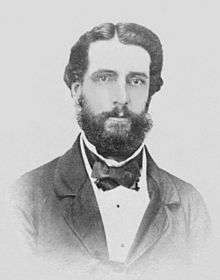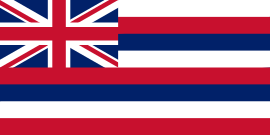Charles de Varigny
Charles Victor Crosnier de Varigny (November 25, 1829 – November 9, 1899) was a French adventurer, diplomat, translator and writer.
Charles de Varigny | |
|---|---|
 | |
| French Consul to Kingdom of Hawaii | |
| In office 1862–1863 | |
| Monarch | Napoleon III |
| Preceded by | Louis Emile Perrin |
| Succeeded by | Germain Marie Maxime Desnoyers |
| Minister of Finance | |
| In office December 24, 1863 – December 21, 1865 | |
| Monarch | Kamehameha V |
| Preceded by | Charles Gordon Hopkins |
| Succeeded by | Charles Coffin Harris |
| Minister of Foreign Affairs | |
| In office December 21, 1865 – November, 1869 | |
| Preceded by | Robert Crichton Wyllie |
| Succeeded by | Charles Coffin Harris |
| Personal details | |
| Born | November 25, 1829 Versailles, France |
| Died | November 9, 1899 (aged 69) Montmorency, Val-d'Oise |
| Nationality | Kingdom of Hawaii French Second Empire |
| Spouse(s) | Louise Constantin |
| Children | 3 |
| Occupation | Author, Diplomat, Politician |
| Signature | |
He was born November 25, 1829 in Versailles. He was educated at Lycée Bourbon. He came with his father to the California Gold Rush. He married Louise Constantin (1827–1894) August 14, 1852 in San Francisco, and worked for a French language newspaper, L'echo du Pacifique founded by Étienne Derbec.[1]
He and his family arrived on the Restless from San Francisco February 18, 1855 in Honolulu. He accepted a position as translator to Louis Emile Perrin the Consul (diplomatic rank below that of ambassador) from France to the Kingdom of Hawaii. he became friends with Scot Robert Crichton Wyllie who spoke several languages due to his travel throughout South America and the Pacific. At that time France and Great Britain were allies in the Crimean War. In 1857 he traveled to the island of Hawaiʻi with German Hermann von Holt. They toured Kīlauea volcano, and visited the rancher John Palmer Parker. They hired the guide "Jack" Purdy who told the story of earlier adventurer Julius Brenchley. Purdy then led them in an ascent of Mauna Kea, the highest mountain in the Pacific.[1]
When Perrin died in 1862 he became acting Consul from France. In July 1863 he visited the island of Kauaʻi, including a visit of the Princeville sugarcane plantation owned by Wyllie.[2]
On December 7, 1863 he was appointed to the Privy Council for King Kamehameha V and on 14 to become the Minister of Finance. Immediately the new king caused a political crisis by refusing to take an oath to the constitution. After a constitutional convention did not agree with his proposal, Kamehameha V proclaimed his own 1864 Constitution of the Kingdom of Hawaii. Varigny generally supported the new constitution, which gave both the king and cabinet ministers more power, and limited voters with property requirements.[3]:132
From 1864 through 1868 he served in the House of Nobles of the legislature. On January 21, 1865 he was appointed to the Bureau of Immigration and Bureau of Public Instruction.[4]
After the death of Wyllie Varigny became Minister of Foreign Affairs on December 21, 1865.[4] One of his first acts was to call off the efforts of John Bowring for negotiating a three-way treaty between France, Great Britain, and the United States. Varigny instead favored an individual reciprocity treaty with each country.[3]:209 Charles Coffin Harris had negotiated a tentative treaty with American Commissioner Edward Moody McCook. However, in the meantime the USS Lackawanna under Captain William Reynolds had arrived February 9, 1867 and refused to leave in response to rumors that France was going to take over the islands. Harris lodged a protest to Secretary of State William Henry Seward. Seward had just completed the Alaska Purchase. Rumors circulated that the U.S. was ready to invade, and some Americans on the islands indicated they would support such a move. On August 28, 1867 Reynolds claimed possession of Midway Atoll. The Captain's clerk leaked letters to the Hawaiian government alleging a conspiracy for starting a rebellion. Varigny forwarded the letters to the U.S. State Department, who then requested to have the clerk arrested.[5]
In March 1868 an increase in volcanic activity resulted in the 1868 Hawaii earthquake and resulting tsunami that caused damage throughout the islands. Varigny helped organize bringing aid to the victims. On May 6, 1868 the Lackawanna sailed back to San Francisco and the clerk was court-martialed. He was found guilty, but quietly had his sentence suspended, probably to avoid any embarrassing publicity.[5]
Later in 1868 he returned to France. He tried to negotiate treaties between Hawaii and European powers, but the conflicts leading up to the Franco-Prussian War prevented much progress. A short treaty with Russia was signed June 19, 1869.[6] He also negotiated treaties with the North German Confederation and Denmark, but these were rejected by the Hawaiian government because they did not allow for any other reciprocity agreements. His leave of absence expired in November 1869. He asked to continue as envoy, but by the fall of 1870 as relieved of any connection with Hawaii. Harris took over the ministry of foreign affairs, while John Mott-Smith replaced Harris as minister of finance.[3]:233 He published a series of articles about his voyages starting in 1873. He then expanded these stories into a book about his 14 years in the islands, followed by others about his experiences in California and other parts of the Pacific.[2]
He died November 9, 1899 in Montmorency, Val-d'Oise near Paris. His son Henry Charles de Varigny was born 1855 and became a biologist.[7] Henry's writings included a biography of Charles Darwin[8] and other works discussing evolution. Henry died in 1934.[9] He also had two daughters.
Works
- Charles Victor Crosnier de Varigny (1871). Quatorze Ans aux Iles Sandwich. Paris: Librairie Hachette et Cie. (French)
- Charles Victor Crosnier de Varigny (1878). Ella Wilson; Parley Pratt; Kiana. Paris: E. Plon et Cie. (French)
- Charles Victor Crosnier de Varigny (1885). Louis Riel et l'insurrection canadienne. Paris. (French)
- Charles Victor Crosnier de Varigny (1885). Emma, reine des îles Havai. Paris: Au Bureau. (French)
- Charles Victor Crosnier de Varigny (1888). L'Océan Pacifique: Les derniers cannibales; îles et terres océaniennes; la race polynésienne; San Francisco. Paris: Librairie Hachette et Cie. (French)
- Charles Victor Crosnier de Varigny (1889). Les grandes fortunes aux États-Unis et en Angleterre. Paris: Librairie Hachette et Cie. (French)
- Charles Victor Crosnier de Varigny (1893). La femme aux États-Unis. A. Colin et cie. (French)
References
- Alfons L. Korn (1967). "Charles de Varigny's Tall Tale of Jack Purdy and the Wild Bull". Hawaiian Journal of History. 1. Hawaii Historical Society. pp. 43–52. hdl:10524/140.
- David W. Forbes (2001). Hawaiian National Bibliography, 1780–1900: 1851–1880. University of Hawaii Press. pp. 589–590. ISBN 978-0-8248-2503-4. Retrieved 22 March 2010.
- Ralph Simpson Kuykendall (1953). Hawaiian Kingdom 1854–1874, twenty critical years. 2. University of Hawaii Press. ISBN 978-0-87022-432-4.
- "de Varingy, Charles office record". state archives digital collections. state of Hawaii. Archived from the original on 2012-03-06. Retrieved 2010-03-22.
- David Zmijewski (2003). "The Conspiracy That Never Existed: How Hawai'i Evaded Annexation in 1868". Hawaiian Journal of History. 37. Hawaii Historical Society. pp. 119–138. hdl:10524/356.
- "Treaty with Russia". June 19, 1869. Retrieved 2010-03-22.
- Henry de Varigny (1896). Air and life. Smithsonian Institution. Hodgkins Fund. p. 1. Translation by the author of L'Air et la Vie
- Henry de Varigny (1899). Charles Darwin. (French)
- Yves Carton (April 2009). "Accueil et diffusion du Darwinisme en France : Henry de Varigny (1855–1934), médecin, chercheur et journaliste, un Darwinien convaincu". Médecin Sciences. 25 (4). (French) Title in English: Reception and distribution of the Darwinism in France : Henry de Varigny (1855–1934), doctor, researcher and journalist, a convinced Darwinian
Further reading
- Charles Victor Crosnier de Varigny (1981). Fourteen Years in the Sandwich Islands. Translated by Alfons L. Korn. Honolulu: University of Hawaii Press. ISBN 978-0-8248-0709-2.
| Government offices | ||
|---|---|---|
| Preceded by Louis Emile Perrin |
Consul from France to Kingdom of Hawaii 1862–1863 |
Succeeded by Germain Marie Maxime Desnoyers |
| Preceded by Charles Gordon Hopkins |
Kingdom of Hawaii Minister of Finance 1863–1865 |
Succeeded by Charles Coffin Harris |
| Preceded by Robert Crichton Wyllie |
Kingdom of Hawaii Minister of Foreign Affairs 1865–1869 |
Succeeded by Charles Coffin Harris |
